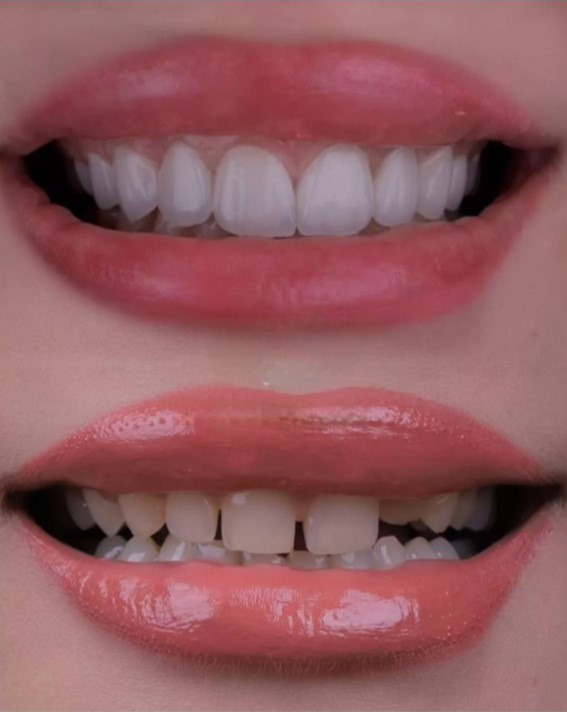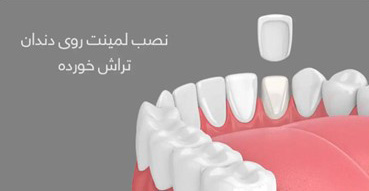Laminate
Who is not suitable for dental veneers?
If you face the issues mentioned below, veneers may not be suitable for you:
- Insufficient enamel: For veneers to adhere properly, your teeth must have enough enamel. The enamel must be of ideal texture and density to avoid complications during the preparation process. If you have significant enamel erosion or have lost a large portion of it, it may be best to avoid veneers.
- Previous dental work: If you’ve had a dental implant or previously undergone cosmetic dental procedures, you must meet specific conditions for veneers to be applied, and the veneer color should match that of your artificial dental prosthesis.

What is Ceramic Dental Veneer?
As the name suggests, ceramic veneers are made from very thin ceramic shells. The process of applying these veneers is similar to placing artificial nails. The dentist bonds the pre-prepared ceramic veneer shells onto the teeth after shaving them, using the proper tools and adhesives. Due to the increased durability of ceramics, this method is a more suitable option for addressing extensive dental issues and significantly helps improve the strength of the teeth.
What Factors Affect the Lifespan of Dental Veneers?
To help increase the longevity of these prosthetics, it is important to recognize the factors that can affect their durability. In general, the most significant factors include:
- Eating habits
- Oral hygiene
- Tooth decay around and beneath the veneers
- Impact from objects to the face
- Teeth grinding (bruxism)
- Aging
- Nail biting and chewing on hard objects
What is the Lifespan of Dental Veneers?
Ceramic veneers typically have a long lifespan and last longer compared to many other prosthetics. With proper care, you can expect veneers to last between 10 to 15 years. However, in some cases, the lifespan of veneers can extend beyond 20 years, depending on how well they are cared for.
People with severe gum inflammation and other oral issues should address these problems first before opting for veneers. If you engage in habits like teeth grinding, nail biting, or placing excessive pressure on your teeth, applying veneers may not be suitable for you, as these actions can quickly damage the veneers.
It is not possible to apply veneers to teeth that are overly angled or misshaped, and doing so may worsen the condition. Additionally, for teeth with deep decay, applying veneers may not be the best option.
Installing Veneers on Filed Teeth
First Session: Consultation and Necessary Assessments
The first step involves visiting a Specialized Dental Clinic or a specialized cosmetic and restorative dentist. During the session, you will discuss your goals and expectations for getting veneers with the dentist. The dentist will then examine your teeth to assess their condition and determine the most suitable approach for your veneers. In some cases, further imaging may be done for a more accurate evaluation. The dentist will review the images to decide how your veneers will be applied. Additionally, the color of the veneers will be selected at this stage.

In the first session, part of the enamel of your teeth will be removed to create space for the veneers. The amount of enamel removed will be equal to or slightly less than the thickness of the veneer. After enamel removal, an impression is made to create a mold for your veneers, ensuring they fit precisely with your teeth. The veneer is then fabricated based on this mold. While waiting for the permanent veneers, temporary veneers are applied. Several methods can be used to cover the temporary veneers, and your dentist will choose the best option for you.
Second Session: Fitting the Veneers
What is the best type of veneer?
Ceramic veneers are considered the best option as they have a longer lifespan and a more natural appearance.
How many front teeth should be veneered for smile design?
To enhance your smile, typically, only the teeth visible when talking or smiling need to be veneered. Most smile designs involve 8 to 10 front teeth, but some may achieve the desired result with just two.
Can veneers replace braces for crooked teeth?
Whether veneers or braces are better for straightening your teeth is determined by the dentist. If your front teeth are slightly crooked, veneers might be a good option. However, if the misalignment is significant, braces will be necessary.
Is ceramic or composite veneer better?
Choosing between ceramic veneers and composite veneers depends on personal preference. However, ceramic veneers generally last longer, look more natural, and are of higher quality than composite veneers.
Our Services for Patients at the Clinic
FAQ
What services are offered at Dr. Hamed Keramat's Specialized Dental Clinic?
Could you provide the clinic's address and how to get there?
How can I know the exact cost of dental services before treatment?
What are the working hours of Dr. Hamed Keramat Specialized clinic?
Dr. Hamed Keramat specialized clinic is open on Saturdays, Sundays, Mondays, and Wednesdays in the afternoon shift, and on Tuesdays and Sundays in the morning shift to serve you, our esteemed patients.
How can I book an appointment at Dr. Hamed Keramat specialized clinic?
To book an appointment at Dr. Hamed Keramat specialized clinic, simply call 88694120 or fill out the contact form on Dr. Keramat’s clinic website, and our experts will get in touch with you as soon as possible.
